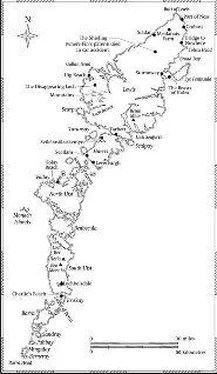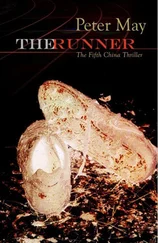Peter May - The Chessmen
Здесь есть возможность читать онлайн «Peter May - The Chessmen» весь текст электронной книги совершенно бесплатно (целиком полную версию без сокращений). В некоторых случаях можно слушать аудио, скачать через торрент в формате fb2 и присутствует краткое содержание. Жанр: Триллер, на английском языке. Описание произведения, (предисловие) а так же отзывы посетителей доступны на портале библиотеки ЛибКат.
- Название:The Chessmen
- Автор:
- Жанр:
- Год:неизвестен
- ISBN:нет данных
- Рейтинг книги:4 / 5. Голосов: 1
-
Избранное:Добавить в избранное
- Отзывы:
-
Ваша оценка:
- 80
- 1
- 2
- 3
- 4
- 5
The Chessmen: краткое содержание, описание и аннотация
Предлагаем к чтению аннотацию, описание, краткое содержание или предисловие (зависит от того, что написал сам автор книги «The Chessmen»). Если вы не нашли необходимую информацию о книге — напишите в комментариях, мы постараемся отыскать её.
The Chessmen — читать онлайн бесплатно полную книгу (весь текст) целиком
Ниже представлен текст книги, разбитый по страницам. Система сохранения места последней прочитанной страницы, позволяет с удобством читать онлайн бесплатно книгу «The Chessmen», без необходимости каждый раз заново искать на чём Вы остановились. Поставьте закладку, и сможете в любой момент перейти на страницу, на которой закончили чтение.
Интервал:
Закладка:
We all looked at her in surprise.
‘She’s right,’ Strings said. ‘Come on, let’s try and talk him down.’
But Mairead grabbed his arm. ‘No, you’ll scare him off. I’ll talk to him.’
We watched as Mairead made her way cautiously towards him, and heard her call out. ‘Hello, I wonder if you could help me? I think we’re lost.’
The man’s head snapped around, frightened rabbit’s eyes drinking her in. He was a man in his fifties I would say, losing his hair. Unshaven, and wearing a shabby raincoat over charcoal-grey trousers and a thread-worn cardigan. ‘Don’t come near me!’ He raised his voice above the roar of the water and glanced beyond her in our direction.
‘What are you doing up there?’ Mairead asked him.
‘What do you think?’
Mairead looked down at the river and shook her head. ‘Not a good idea. You’ll ruin your shoes.’
He looked at her with something like disbelief, and then she smiled, and there was something about Mairead’s smile that no man I ever knew could resist. He smiled back. A timid, uncertain smile. ‘They’re not new,’ he said. ‘So it won’t really matter.’
She looked at his feet. ‘You’re wearing odd socks.’
He seemed surprised, and took a look for himself. ‘Who cares?’
‘There must be someone who does.’
His lips tightened into a grim line and he shook his head. ‘No one.’
‘No one at all?’
‘The only one who ever did is gone.’
I saw her eyes fall upon the man’s left hand holding the lamp post and the band of gold on his third finger. ‘Your wife?’
He nodded.
‘She left you?’
‘She’s dead.’
‘Recently?’
Again he shook his head. ‘A year ago today. Cancer. It was a long time coming.’ He turned to look at the water flashing below, then back at Mairead. ‘I tried so very hard. But I just can’t do it any more.’
Mairead moved carefully, then, turning around to pull herself up into a sitting position on the parapet at his feet, hands flat on the wall on either side of her. ‘No children?’
Another shake of the head. Then, ‘Well, yes. But he’s in Australia. I told you, nobody cares.’
She tilted her head to look up at him. ‘I care.’
He almost laughed. ‘You don’t even know me.’
‘Yes, I do. I know you very well.’
‘No, you don’t!’ His tone was hostile now.
‘Yes I do.’ And I saw a shadow cross her face, a cloud of real emotion. ‘You’re every man who’s ever lost the woman he loves. You’re my dad. I wish I’d been there for him. But I never knew, you see. He never said. And I never found out till he was gone. The young are too busy with their own lives. And it’s easy to forget that your folks still have lives, too. Feelings. You never lose those, even when you get older.’ She turned moist eyes towards him. ‘Have you told him? Your son. Have you told him how you feel?’
‘I’m not going to bother him with stuff like that.’
‘And you don’t think he’ll be bothered when the police come knocking on his door to tell him his father killed himself? You don’t think he’ll wonder why you never spoke to him? Or the guilt he’ll probably live with for the rest of his life, thinking there’s something he could or should have done?’
The man’s face crumpled, then, and tears rolled down his cheeks with the rain. ‘I didn’t want to be a nuisance.’
Mairead eased herself off the wall and held out a hand towards him. ‘Come on,’ she said. ‘You’re not a nuisance. Let’s go and call him. Right now.’
‘It’s the middle of the night there,’ he said.
Mairead smiled. ‘He won’t mind. Trust me.’
He looked at her for a long moment, and she held his eye, hand still outstretched, until finally he grasped it and jumped down on to the pavement beside her. Mairead put her arms around him and hugged him. The rain intensified then, as if crying with them, soaking them both as they stood in the middle of the bridge, darkness falling around them, the lights of cars raking past, drivers oblivious to the little life-and-death drama playing itself out by the parapet.
Then, still holding his hand, she walked him towards us.
‘Come on, mate,’ Roddy said, ushering him into the car. ‘Let’s get you home.’
The man lived in a semi-detached house in a short suburban street on the outskirts of the town. A drab, miserable place. Mairead switched on the lights and put on a kettle. A train rattled past the foot of a long, narrow garden with a dilapidated potting shed and an overgrown lawn.
Roddy went next door and came back with the neighbour, an elderly woman who fussed and flapped in the tiny kitchen where the rest of us were gathered, and said she knew a friend who would come and sit with him. And Mairead sat him down by the electric fire with the phone, and dialled the number of his son in Australia.
We left him then, with the neighbour keeping an eye till the friend arrived, the man talking hesitantly to his son ten thousand miles away. I could not really imagine what kind of a conversation it might be. But he was alive, and he was speaking about how he felt instead of bottling it up and driving himself to suicide. And that was all down to Mairead.
On the path, as we walked back to the vehicles parked in the road, I said to her, ‘I didn’t know your parents were dead.’
She shrugged. ‘They’re not.’ And then she laughed at my frown. ‘Oh, Fin, Fin, you’re such an innocent. The situation called for a story, so I gave him one. When I sing about a broken heart, or everlasting love, folk need to believe that it’s true. That my tears are real. I’m good at that.’
I thought about the emotion which had clouded her face as she lied to the man on the bridge, and how easily both he and I had been convinced. And I realized then that I could never trust her to tell me the truth about anything.
The upshot of it all was that we arrived an hour late for the gig on the pier. The manager was a skinny, uptight, bald little man called Tuckfield. He wore a blue suit with brown shoes. A combination I had never trusted. He was red-faced and close to apoplexy. And, of course, there was no sign of the smooth-talking Donald to pour salve on troubled waters.
‘I have three hundred paying customers in there baying for my blood or their money back,’ he spluttered at Roddy.
Me and the guys left Roddy to try and explain as we unloaded the van. I don’t know how we did it, but the band was on stage and opening the show within half an hour. Myself, and a Glasgow boy called Archie, who drove the car, lay down in sleeping bags in the back of the van to try to get some sleep, and the band played for almost three hours to make up for their late arrival.
The first I knew that there was any trouble was when the back doors of the van were flung open and Roddy stood out on the pier, his face grey with anger. ‘That bastard won’t pay us!’
‘What?’ I sat bolt upright. If the band didn’t get paid, I wouldn’t get paid.
‘We played nearly an hour longer than agreed to make up for being late, but he still says we were in breach of contract and won’t pay.’
I jumped out the back. ‘Let’s go talk to him.’
We found him in his office at the end of a corridor behind the stage. He was wary and defensive when Roddy and I came in, and took an instinctive step back from the door. He raised a hand. ‘I don’t want any trouble.’
‘There’ll be no trouble,’ I said. ‘Just pay us and we’re gone.’
He waggled a finger. ‘No, no, no. You people left me hung out to dry tonight. That wasn’t professional. You broke your contract. Get me your manager on the phone, and when we’ve agreed compensation, you’ll get your money.’
Читать дальшеИнтервал:
Закладка:
Похожие книги на «The Chessmen»
Представляем Вашему вниманию похожие книги на «The Chessmen» списком для выбора. Мы отобрали схожую по названию и смыслу литературу в надежде предоставить читателям больше вариантов отыскать новые, интересные, ещё непрочитанные произведения.
Обсуждение, отзывы о книге «The Chessmen» и просто собственные мнения читателей. Оставьте ваши комментарии, напишите, что Вы думаете о произведении, его смысле или главных героях. Укажите что конкретно понравилось, а что нет, и почему Вы так считаете.












